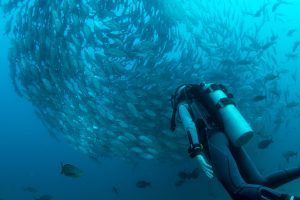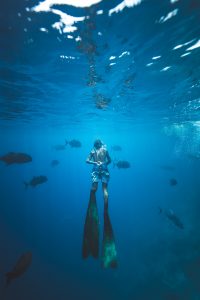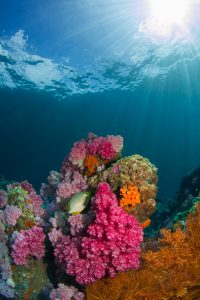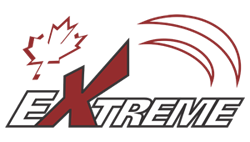
Photo by Pascal van de Vendel
Diving is to swim underwater with or without equipment. Diving has many uses like environmental research, military purpose or commercial diving like underwater construction but a lot of people dive as a recreation sport which is amazing and categorized by open water diving, wreck diving, cave diving, wall diving, deep diving….
Diving underwater has many methods like surface-supplied diving, saturation diving, Atmospheric diving suits (ADS) but the most popular sports diving are Scuba Diving and Free Diving.
Scuba Diving is to dive underwater using Self Contained Underwater Breathing Apparatus (SCUBA). The equipment for scuba diving are Diving Mask, Wet or Dry suit, Weight System, Buoyancy Control Device (BCD), Air or Nitrox Cylinder, Regulators, Pressure Gauge, Depth Gauge, Compass, Fins, Dive Light, Knife, Surface Marker Buoy (SMB), …
Diving has a lot of hazards like Decompression sickness, arterial gas embolism, animal attack, losing body temperature… And you need to get a certificate to go diving. There are many diving certificate agencies worldwide and there isn’t a central international agency. Below are some of the most popular certificate agencies:
- American and Canadian Underwater Certifications (ACUC)
- British Sub-Aqua Club (BSAC)
- Confederation Mondiale des Activites Subaquatiques (CMAS)
- International Association for Handicapped Divers (IAHD)
- International Association of Nitrox and Technical Divers (IANTD)
- National Association of Underwater Instructors (NAUI)
- Professional Association of Diving Instructors (PADI)
- Scuba Diving International (SDI)
- Scuba Schools International (SSI)
- Technical Diving International (TDI)

Photo by Shifaaz shamoon
Freediving is another form of recreational underwater sport which divers swim underwater without breathing apparatus. Freediving equipment are Mask, Fin or Monofin, Wet Suit, Depth Gauge, Weight System, Buoy & Line…
The maximum depth reached in freediving is 253.2 m by Herbert Nitsch from Austria at Santorini, Greece in 2012 and maximum time underwater is 11 min 35 sec by Stéphane Mifsud from France at Hyères, Var, France in 2009.
Scuba Diving and Freediving in Vancouver, British Columbia (BC), Canada has various choices of sites like Lighthouse Park, Bowen Island, Keats Island – Eastbourne, Pavilion Lake, Sunshine Coast, Nanaimo and Victoria with a good water temperature, walls, wrecks, and you can see a lot of amazing creatures like Giant Pacific octopuses, six-gill sharks, wolf eels, … and there are always places to dive, year-round.
Safety Tips:
- Dive within your Limit and Choose dives that match your training, experience and confidence.
- Make sure you are ready to dive. Don’t dive if you fell ill or do not feel right.
- Don’t touch anything underwater, it may be dangerous or you may damage the environment.
- Always dive with a buddy and hire a local guide in new sites.
- Check your equipment very carefully before each dive
- Watch your ascent rate. The ascent rate depends on how deep you dive, however complete safety stops on all dives that exceed 10m depth.
- Plan your dive on depth, time, and safety stops so you could be on the surface with a minimum of 50 bar.
- Current conditions are very important, find out about it before diving.
- Be aware of boats in ascending. Use Surface Marker Buoy and Plan your ascent as close as possible to your boat.
- Look at your gauge regularly. You may forget everything in beautiful sites.
- If it passed a long time since your last dive, do some easier dives to regain your ability.
Most popular companies to supply Diving Equipment are: AGA, Apeks, Aqua, Aqualung, Atomic, Bigblue, Blue Reef, Cressi, Dive Rite, Faber, Garmin, Genesis, Highland Millworks, Hollis, Innovative Scuba, Lifeguard, Manta, Mares, Max Air, McNett, Ocean Reef, Oceanic, Omer, OTS, Poseidon, Ratio, Scubapro, Sealife, Sherwood, Subsalve USA, Suunto, Torpedo, Tusa, Ultimate Survival, Underwater Kinetics, UNI-QUIK, US Divers, XS Scuba, Zeagle

Photo by Milos Prelevic
Useful Links:

